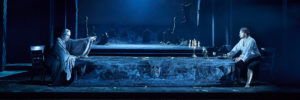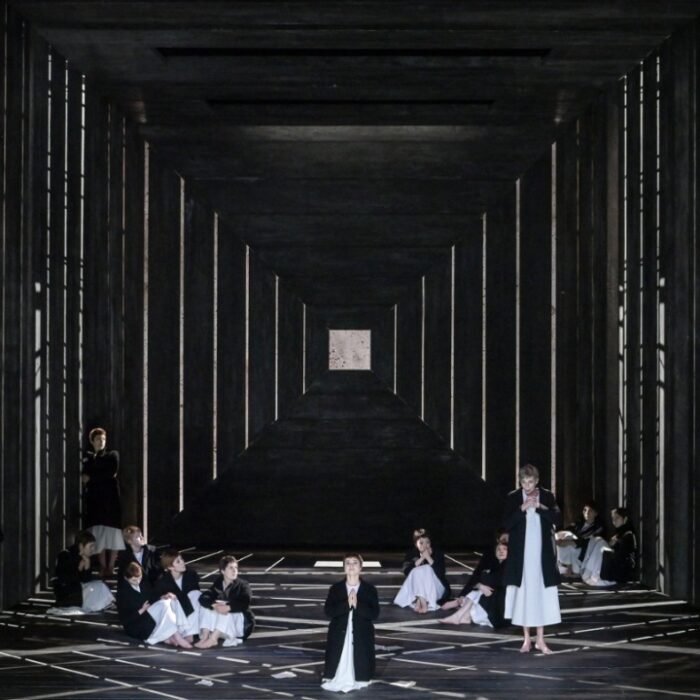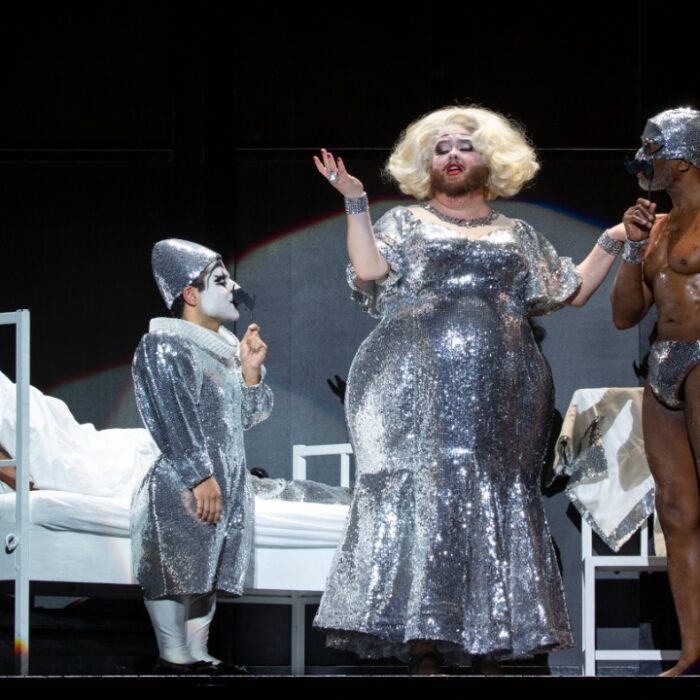
Opera Australia Review 2023: Don Giovanni
Andrei Kymach Stars in David McVicar’s Dark Take on Mozart’s Famed Masterwork
By Gordon Williams(Photo credit: Keith Saunders)
The designation of Lorenzo Da Ponte’s libretto for Mozart’s 1787 opera “Don Giovanni” is “dramma giocosa” – that is, playful or jocular drama. However, Don Giovanni (aka the legendary Don Juan) roamed Europe seducing women (2,065 of them by calculation of the servant Leporello in Mozart’s version of the tale), and the 19th century’s Romantics saw the demonic side of this work.
So, you might say, did Scottish director Sir David McVicar in this 2014 Opera Australia production revived by Warwick Doddrell at Sydney Opera House on January 5 for the start of Opera Australia’s 2023 season.
This was a cruel “Giovanni” – making no bones about his charming nastiness – and light on the farce of Giovanni’s previously-dumped beauties (Donna Anna and Donna Elvira) pursuing him as he in turn pursues current attractions. (Well, of course, one of those beauties, Donna Anna, is the daughter of the Commendatore a man Giovanni has murdered, so let’s not over-emphasize the farce). Yet there were still laughs as with Yuri Kissin’s well-timed punchline of “and in Spain, 1,003” in the Act one aria which is named for the catalogue cited above.
Darkness Reigns
This production was fascinating in its darkness.
English designer Robert Jones set the tone with a performing space, “a world of shadows,” that was virtually a charnel house with piles of bones and skulls pushed to the corners in heaps, the atmosphere of an abandoned industrial space complete with flaking ceilings, and a staircase that swung down occasionally but held out little promise of escape from the depraved claustrophobia.
Escape? For whom – the Don or his victims? Opera Australia’s brief synopsis, in both brochure and program booklet, begins, “It is the last day of Don Giovanni’s life, but he doesn’t know that…” This sense of countdown promises an inevitability that will be enjoyable regardless of happy or sad ending or degree of farce.
Jones’ black costumes also enhanced the somber atmosphere. And in fact it was as if the production deliberately made it difficult at times to distinguish Don Giovanni (Ukrainian baritone, Andrei Kymach) at least in overall affect from his servant Leporello (French-Israeli bass-baritone, Yuri Kissin making his Australian debut) who may grumble about his master’s predatoriness but is definitely along for the ride.
They even had co-ordinated stage business together, and one of the most impressive (indeed chilling) moments was the close approximation of vocal timbres during that scene in Act two when Leporello and the Don swap garments (the Don’s idea of course, as is nearly all the trouble-making).
There was occasional relief in David Finn’s lighting design – Elvira (Bronwyn Douglass) framed in a window-sill in Act two scene one, enhancing the poignancy of her moment (actually, the trio: “Ah taci, ingiusto core”). Douglass’ Elvira was an otherwise brisk and business-like Elvira, with, perhaps, an underlying sturdiness that made believable her ultimate acceptance of the situation.
There was, though, the occasional chink of light at the top of those tempting stairs. Most notably, the stage brightened for the peasant “white wedding” between Zerlina (soprano Cathy-Di Zhang) and Masetto (baritone Andrew Williams), where we were able to gauge well the depravity of the Don’s pursuits as Kymach and Kissin – as two bully-boys – turned this innocently enthusiastic scene into something sinister and menacing.
This was arguably the most effective scene in the whole production where we could get the full measure of Giovanni’s corruption – the Don crosses class boundaries – can’t even “pick on someone his own size.” Perhaps this was the production’s key, a glimpse into how an ordered world should be, before it is corrupted.
The Cast
Masetto as played by young Australian baritone Andrew Williams seemed to smell danger right away and revealed real apprehension and guardedness. This was not the loser-Masetto whom you might (I might) later, sneakingly, enjoy seeing beaten by the Don, though the spectacular continuo of fortepianist, Siro Battaglin, during the beating, came across as barracking as if from the sidelines – humor welling up from the orchestra pit.
And while the Giovanni/Zerlina duet “Là ci darem la mano,” sung after Giovanni has gotten fiancé Masetto out of the way, may be one of the most charming extractable items from the overall opera, there was real terror in the eyes of Zerlina (Cathy-Di Zhang) as Giovanni reached for her “mano.” Perhaps the only character who comes across as truly sympathetic in this whole production, Zerlina’s dilemma, in Zhang’s interpretation, was palpable: “I want to and don’t want to.” What does it take to stop us all being Giovannis?
But what sort of Don Giovanni was Ukrainian baritone Andrei Kymach?
One who owned, even exulted, in his own shadow. His Act two serenade (“Deh vieni alla finestra, o mio Tesoro”), delivered because – let’s face it – he’s now trying to seduce Donna Elvira’s maid, was one of the most purely charming musical moments in the whole work – smooth, urbane, a relief, with its graceful musical arc as Kymach gave us the nobility of the title role peeping out from under the decadent surface. And it’s not as if this Don wasn’t aware of his depravity – “What have I done?” hissed Kymach in horrified tones over the Commendatore’s body in scene one. But later, unrepentant while fully aware of consequences, he assumed the same pose over the Commendatore’s prone gravestone likeness, kissed the likeness’ brow and drove the sword in again.
I have a confession to make. In “Don Giovanni,” I sometimes find myself wishing that the musical (tonal) plan was not so precious as to inhibit directors’ cuts. Though I welcomed this production’s attempt to introduce a ticking clock (“It is the last day of Don Giovanni’s life…”) I still found myself inwardly chafe late in the piece at modulations that meant a number was going to go on past the point where I’d already cottoned on to its dramatic purpose. And yet, conductor Guillaume Tourniaire’s relish in directing this score made me realize that in modulating these few extra times, Mozart himself was having fun.
Admittedly, there were moments where the music could be enjoyed in a way that took an audience-member out of the dramatic situation. One of those was the tenor aria “Il mio tesoro” – Ottavio’s perhaps-redundant vow to avenge Donna Anna’s father the Commendatore’s death but it was Spanish tenor Juan de Dio Mateos’s delivery of his earlier number “Dalla sua pace” (On her peace depends mine) which really impressed – a completely satisfying scena in itself, as Ottavio was left alone on stage in the wake of the Commendatore’s funeral cortège.
Traditionally Don Ottavio may come across as wooden and ineffectual. How useful is he going to be in avenging the murder of his fiancée’s father, the Commendatore? Yet Sophie Salvesani’s “wonderful distress” (as I scribbled in the dark) nicely complemented Ottavio’s imperturbability in their earlier scenes. And her final recitative and aria (“Crudele? Ah no, mio bene!…Non mi dir, bell’idol mio”) with her virtuosic coloraturas provided a fresh bout of energy to the last few moments of the work.
Hue of Seriousness
French conductor, Guillaume Tourniaire, brought an appropriate hue of seriousness to his musical conception and yet vividly conveyed the life in the piece. The wind band music at Giovanni’s feast, at the end, which quotes popular numbers of the time (even from Mozart’s own “Marriage of Figaro”) was raucous and fun, refreshing the ear through all this darkness.
Incidentally, the sight of onstage bands at the end of Act one playing in different times at Don Giovanni’s ball – though a noted feature of this score, and one that can be customarily shown visually on the stage as if from different locations in the Don’s palace – here seemed visual representation of disorder. They were nicely complemented by Andrew George’s choreography, almost a Hadean vision of a court dance; and the servant sneaking into profiteroles through the scene was a nice comic touch.
If this makes you wonder whether such a production could be enjoyable, let me add that it was, in, perhaps, the way catharsis is meant to be enjoyable in Greek tragedy.
I didn’t actually need the “giocosa,” and in fact, so effectively and unremittingly horrifying had been the return from the grave of the murdered Commendatore, bass David Parkin, toward the end that I was half-hoping that Tourniaire and McVicar would dispense with the buffo finale which provides the moral.
As Opera Australia’s full synopsis reads: “The earth opens and furies spring up and drag him below into hell”. That would have worked for me, even though I acknowledge that the Romantic era’s cutting of this finale is now unfashionable.



